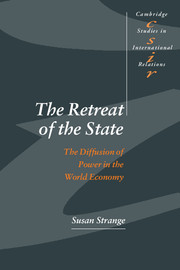Book contents
3 - The limits of politics
from Part I - Theoretical foundations
Published online by Cambridge University Press: 07 October 2009
Summary
Anyone who, like myself, has been led by one path or another to the study of international political economy has probably shared my experience of being shot at from both sides – by the political scientists and by the economists. It feels as if one had been caught, defenceless and exposed, in the no man's land between two entrenched armies. On one side, in one set of dug-out trenches, are the armies of Politics and International Relations. On the other, the powerful forces of Economics, led and commanded by generals trained in the neo-classical tradition of liberal economics. Against the political scientists, one is constantly crying for more attention to economic factors, to markets, to prices, to finance. To the others, the economists, one is constantly protesting with equal vehemence the relevance of choices that are essentially subjective and political, the importance of law and organisation for the functioning of markets and to constrain the behaviour of market operators, the role of history and perceptions of history in policymaking. The Germans or Hungarians, for example, are not more rational than, say, Americans, in their pursuit of and veneration for stable money. They just happen to have had a different folk memory of what unstable money and inflation can do to personal fortunes and to social and political relations.
- Type
- Chapter
- Information
- The Retreat of the StateThe Diffusion of Power in the World Economy, pp. 31 - 43Publisher: Cambridge University PressPrint publication year: 1996
- 1
- Cited by

